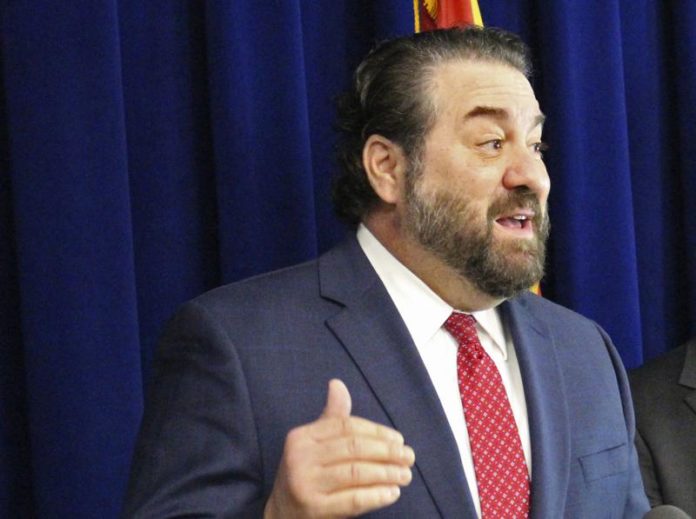
An Arizona judge on Friday rejected Republican Attorney General Mark Brnovich’s request that he order Democratic Secretary of State Katie Hobbs to do a major rewrite of a nearly 300-page document that tells county election officials how to manage the 2022 elections.
Yavapai County Superior Court Judge John Napper had signaled at a hearing last week that many of the complaints Brnovich raised when he refused to approve an updated Election Procedures Manual Hobbs submitted for his review and approval last October were unsupported. He said Hobbs in most cases had followed the law when she wrote the manual for voting and tallying ballots.
In Friday’s ruling, Napper said Brnovich had waited so long to sue over his perceived problems with the manual that he could not order the few changes that may be merited. Napper instead sided with Hobbs and GOP Gov. Doug Ducey’s position and said the last manual approved by all three in 2019 would be in effect for the upcoming elections.
“At this point in the game, there is no mechanism for the Court to assist the parties in constructing an EMP which complies with (the law) within the timelines of the statute,” Napper wrote. “The Complaint was filed far too late for this to occur without disrupting elections that have already begun.”
The two elected officials have tangled for more than a year. Brnovich is seeking his party’s U.S. Senate nomination, and Hobbs is seeking the Democratic Party’s nomination for governor.
Hobbs said in a statement that Napper “rejected AG Brnovich’s attempt to rewrite election rules based on his own political preferences.
“This is a win for the rule of law – and for Arizona’s voters.”
Brnovich spokeswoman Brittni Thomason said he was disappointed in the ruling, but noted that Napper had said last week that some parts of the manual fell short of legal requirements. She blamed the delay on an earlier state Supreme Court case and bar complaints filed against him by Hobbs.
The secretary of state is charged with writing rules used by election officials in Arizona’s 15 counties every two years. Once that is done, she submits it to the attorney general and governor to review and approve the document.
That happened with no major problems in 2019, with the Democratic secretary of state and the Republicans who hold the other two elected seats working together to address any issues.
Last year though, Brnovich and Hobbs were involved in a tit-for-tat that boiled over into the procedures manual. When Hobbs provided the draft to Brnovich on October 1, he took no action until early December, then demanded that whole sections be removed.
When Hobbs reached out to negotiate any changes, Brnovich demanded she simply adopt all his changes. When the December 31 deadline for it to be approved passed, she told local officials the old manual would guide this year’s elections.
Brnovich waited until April 21 to make the next step. That’s when he sued in Yavapai County and sought to get Napper to order the changes he wanted.
Napper had noted in recent hearings that the attorney general’s refusal to engage left Hobbs with no way to produce a needed manual.
Napper’s ruling means election officials will be working off a three-year-old set of rules, but Hobbs has provided county officials with guidance on changes in new laws and court rulings that affect that set of rules.
Brnovich and Hobbs have tangled in other fights as well. Earlier this year, Brnovich threatened to investigate Hobbs for temporarily taking down an online signature collection system used by candidates in order to update it with new congressional and legislative district maps approved early this year.
Hobbs then sought a judge’s intervention to stop that promised investigation, but the judge said her request was premature. Brnovich then farmed out the investigation to the Cochise County Attorney’s Office.
Napper had signaled during an April 30 hearing that he wanted to find a way to get a new set of rules in place before the August 2 primary. But in the end, he was unable to do so.
Republished with the permission of The Associated Press.














